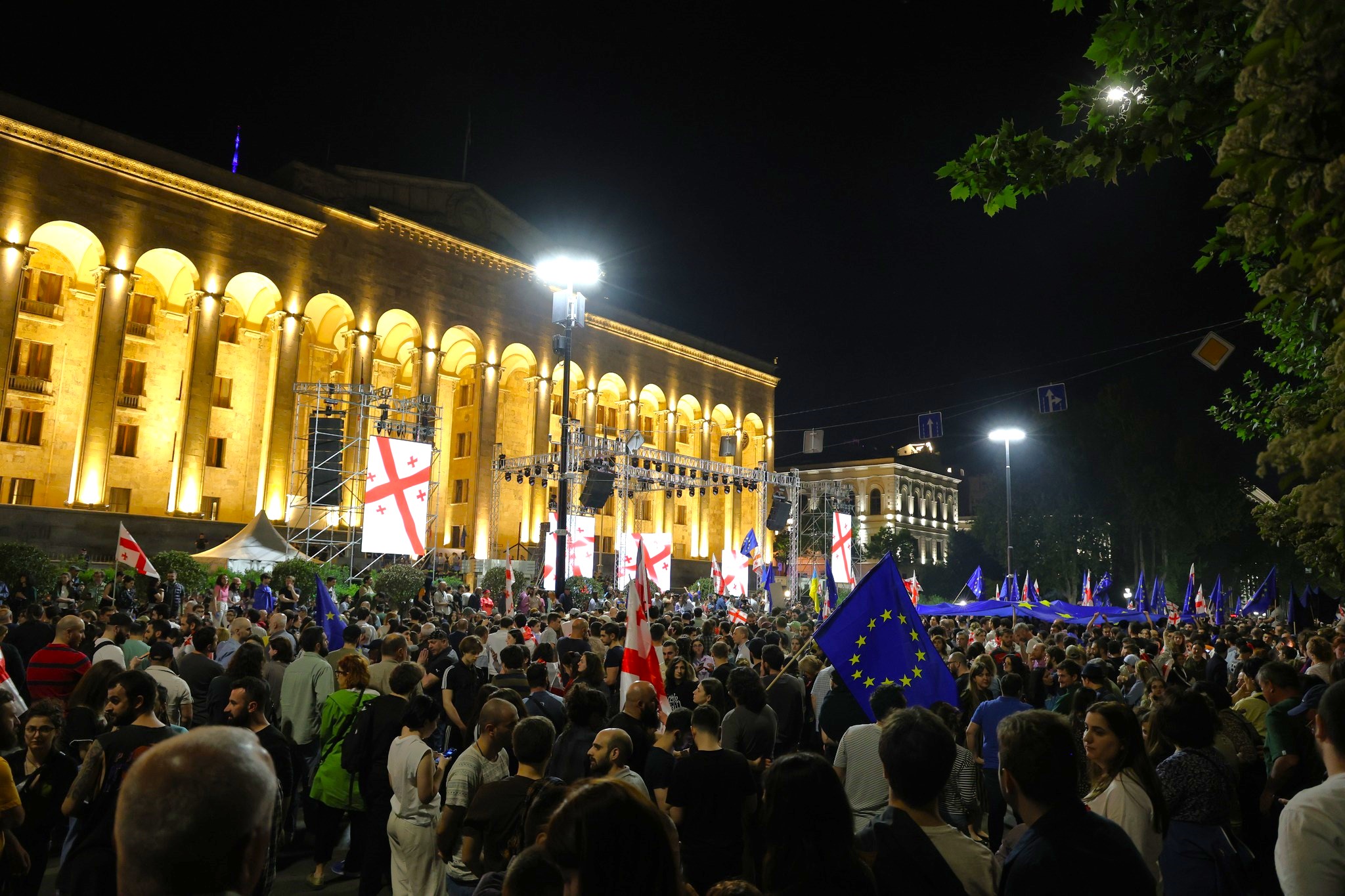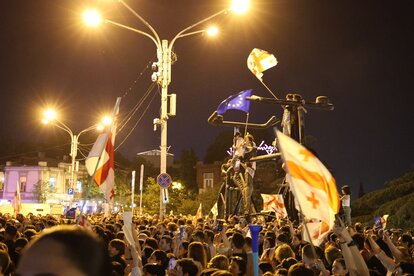Georgia at the crossroads
The Fight for Freedom: Georgia's Battle Against Authoritarianism

Georgia stands at an ominous crossroads as the ruling Georgian Dream party resurrects its incendiary draft law to label and crack down on Western-funded civil society groups and media organizations. Legislation, which ignited massive public protests last year, now imperils Georgia's hard-fought European and Euro-Atlantic future. The renewed push to advance the "Kremlin-inspired" repressive legislation bears all signs of a calculated Russian offensive to sabotage Georgia's Western integration. With tens of thousands pouring into the streets demanding this law's withdrawal, the standoff marks a decisive turning point that will chart Georgia's geopolitical trajectory amid the broader regional clash of Western democracy vs. Russian authoritarianism following Russia's invasion of Ukraine. The crisis epitomizes an existential struggle with profound ramifications not just for Georgian sovereignty but for the European security order and the very credibility of the EU enlargement process itself. The stakes could not be higher as Georgia stands at the precipice.
On April 3, the majority leader of Georgia's ruling Georgian Dream party announced the reintroduction of the draft law targeting Georgia's Western-funded Civil Society Organizations (CSOs) - which the GD had withdrawn last year after facing significant opposition during massive rallies last spring. This action was followed by the European Council's decision to grant Georgia candidacy, with membership negotiations expected to commence by the end of 2024.
While Government representatives vehemently argue that the aim is to enhance transparency within CSOs, the reintroduction of the law has triggered ever-larger protests. Protesters demand the withdrawal of the legislation and condemn the move as a deliberate betrayal of Georgia's European future by GD.
Despite both internal and international pressure, the timing and GD's persistence suggest that this move is a carefully orchestrated maneuver, which may not originate from the sovereign authority of Tbilisi but rather reflect an extension of Moscow's strategy towards the West and the broader region. The decision may be entirely motivated by the geopolitical shifts that have been unfolding since Russia's full-scale invasion of Ukraine in February 2024. The EU and the US are as united as ever in establishing boundaries against Putin's Russia while also reassessing its policy towards the Caspian and Black Sea Regions, thereby reshaping its Eastern enlargement policy.
Thus, it seems Russia has already started preparing for the post-war period. After the end of the war, a new type of Iron Curtain is expected to fall between the democratic world and Russia. Before the next EU enlargement, which is expected in 2030, whichever country manages to distance itself entirely from Russia will become part of Europe, while others will remain on the Russian side of that curtain. So, it's the same battle as in Ukraine, but without the brutality of a full-scale war.
Moscow's goal is to be prepared for when it comes to that point. Thus, they aim to create facts on the ground to maintain control over as many countries in the Black Sea and Caspian regions as possible. Maintaining control over Tbilisi is key in this regard, as the speed and extent to which other Caucasian countries can move away from Russia largely depend on this leverage, particularly given the current circumstances, where Azerbaijan has already established a new alliance with Turkey. At the same time, Armenia, realizing Russia's unreliability, has renewed and intensified talks, increasingly looking westward. If Georgia falls prey, Yerevan’s European aspiration will be postponed indefinitely.
Russia’s geopolitical and long-term implications of this decision are further indicated by its highly unpopular nature, which is harmful to GD in light of the upcoming elections. If Moscow had not made this decision, the government could have easily waited until after the elections to secure its legitimacy before proceeding with the legislation. Even more importantly, its timing strangely coincides with similar laws being adopted in Kyrgyzstan a couple of weeks ago, being reintroduced by the Russian-backed Dodik in Republika Srpska, Serbian part of Bosnia Herzegovina also earlier this month, and being negotiated in the occupied region of Abkhazia. It appears to be an orchestrated effort by Russia to consolidate its geographic sphere of influence and forcefully push the West out of the region.

Moscow has effectively undermined Georgia’s sovereignty for years through oligarch Ivanishvili and his Georgian Dream party being in power. Despite officially maintaining a pro-Western image, they have played a double game. However, after Russia's full-scale invasion of Ukraine, it's now time for Ivanishvili to finally come out with his true identity and intentions.
Today, many allies describe Georgia as a captured state, where all state institutions and the economy are practically monopolized and controlled by one person - Bidzina Ivanishvili. The next step is to silence the remaining critical voices to secure full power, as seen in the reinforcement of the Foreign Agents law, mirroring Russia's actions post-2012. We remember a vibrant civil society back then, along with vocal opposition and critical media. However, since 2012, all civil society actors who were beyond the government's control were first labeled as foreign agents, then as the so-called fifth column, and finally as terrorists and extremists. They all had to leave the country, end up in jail, or were physically eliminated. The same scenario is envisioned for Georgia, with the same screenplay and director.
The level of state capture is exemplified by the fact that the proposed "foreign agents" initiative directly contradicts Article 78 of Georgia's constitution, stating that "Constitutional bodies shall take all measures within the scope of their competences to ensure the full integration of Georgia into the European Union and the North Atlantic Treaty Organization." In a different political environment, this article could have provided grounds for a case in the Constitutional Court to challenge the law's constitutionality. However, in the captured state, the Constitutional Court remains largely ceremonial, excluding the possibility of any meaningful Constitutional review that could uphold Georgia's stated commitment to Euro-Atlantic integration.

By now, it is evident to all that the law is not about transparency but about pushing the West out of Georgia. Ironically, the government itself is opaque, with the former Prime Minister reportedly gifting forests to his wife and using a government plane to take his son on private trips, all while regularly concealing public information that must be disclosed by law. All expenses by Georgian NGOs are closely monitored and accounted for in accordance with tax laws, meaning every cent spent must be properly reported to the relevant tax authorities. Unlike business contracts between the government and private companies, which can be protected by commercial confidentiality provisions, transactions involving civil society organizations face no such constraints around disclosing important details to the public. Furthermore, donor organizations adhere to high standards of transparency and financial reporting. They closely track each transaction, requiring supporting documentation, and publish reports that are sometimes subjected to external audits available to the public. While these stringent standards can make operations challenging, especially for smaller NGOs, they are scrupulously followed. NGOs spend considerable time preparing reports and financial justifications not only for government oversight but also to satisfy donor requirements. No expenditure occurs without pre-approval, ensuring that funds are allocated only to authorized activities.
Besides, in a democracy, it's not civil society but the government and state officials that should be transparent in their expenditures in the first place. And that's exactly what they want to avoid — being monitored and exposed by CSOs for high corruption and deliberate wrongdoings.
On the frontline now stands an entirely new generation born in a free country, speaking no Russian but fluent in several European languages. When you observe them, they bear no resemblance to Soviet children, not even those of the post-Soviet era. However, while Ivanishvili's GD stepped back tactically last spring, it may be - different now. Last year's success was twofold: a combination of unprecedented national unity against the law and unified international pressure that caught the government by surprise. However, this time, there is no surprise effect anymore, and the ruling party is prepared to push through the law regardless. Therefore, alongside the persistence of the Georgian people, international pressure needs to be strong, precise, direct, and impactful, targeting Ivanishvili and every government official who supports the law against the will of the Georgian people.
If adopted, technically, Georgia will not become Belarus overnight. It's unlikely they'll immediately pull the reigns to make the West and others believe there was nothing wrong with this legislation. Some pro-government NGOs will register, while others will engage in legal disputes. But the ultimate goal is to silence anyone who might express critical voices and to shut down all platforms for such expression, much like what happened in Russia following the reinforcement of the Foreign Agent’s law in 2012, which gradually targeted and eventually affected every single organization not controlled by the state over time.
Thus, the worst assumption now would be to believe that there is still room for negotiation with the ruling Georgian Dream party, to calm the demonstrations down and resume business as usual leading up to the elections.
Russia has spent countless resources over the last 12 years alienating Georgian society from the West through its proxy oligarchs and extensive propaganda aimed at demonizing the West and fostering Soviet nostalgia. Nothing has worked. Georgians are as united as they can be in choosing Europe over Russia. Now is the time for our Western allies to take concrete actions to support the Georgian people and secure Georgia as a key part of European security architecture.
